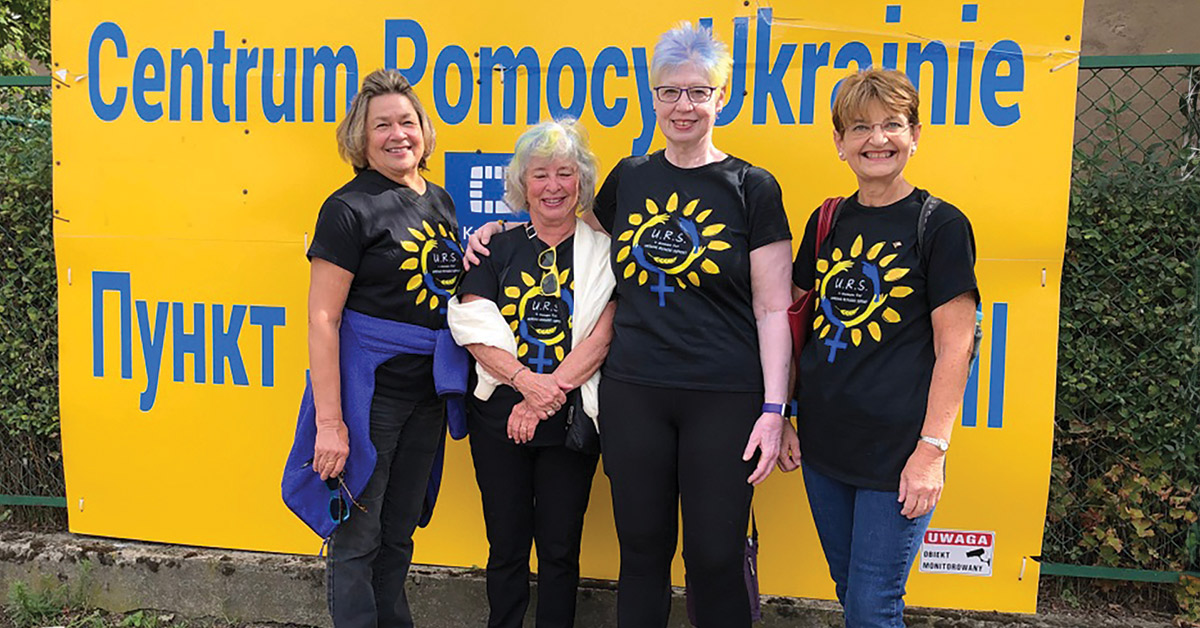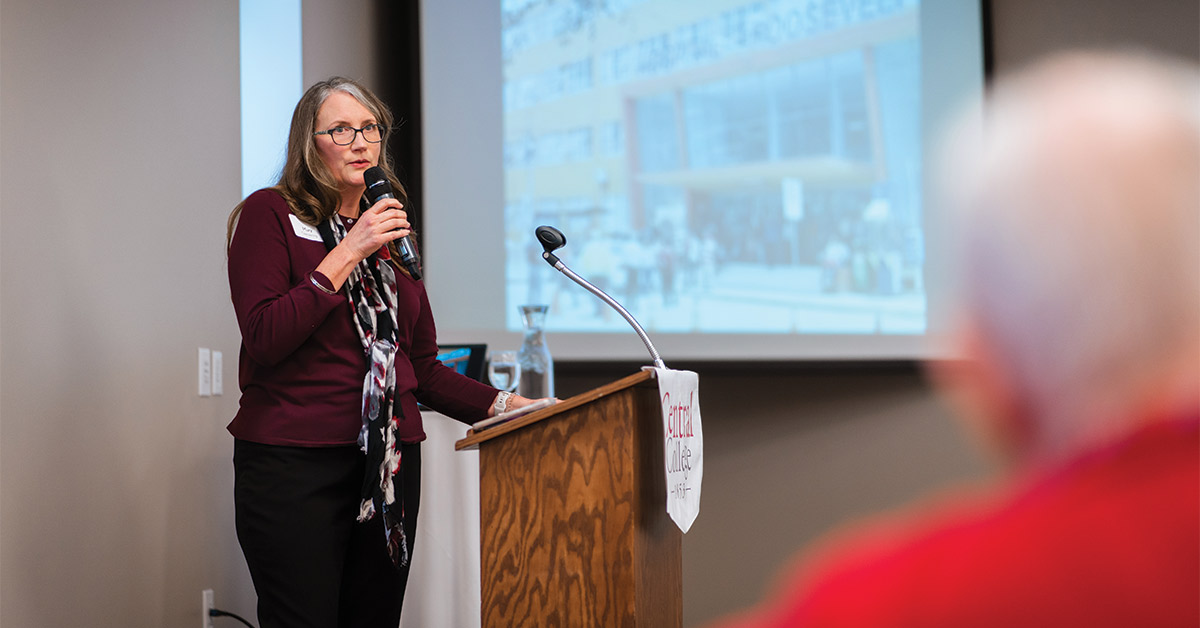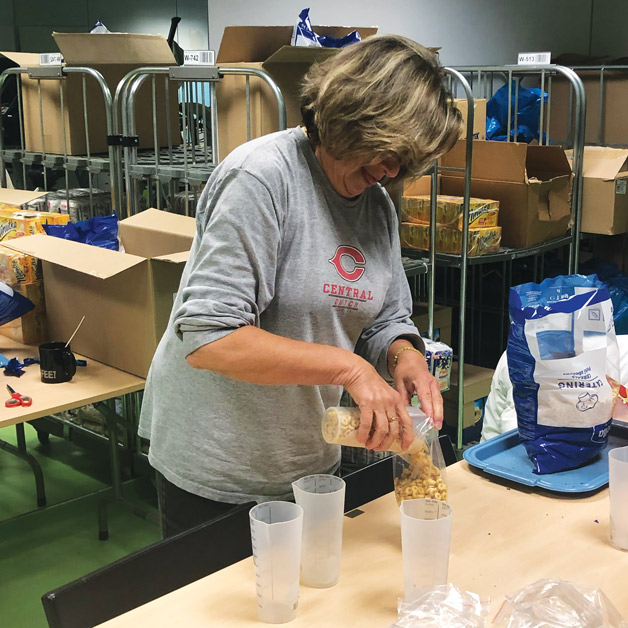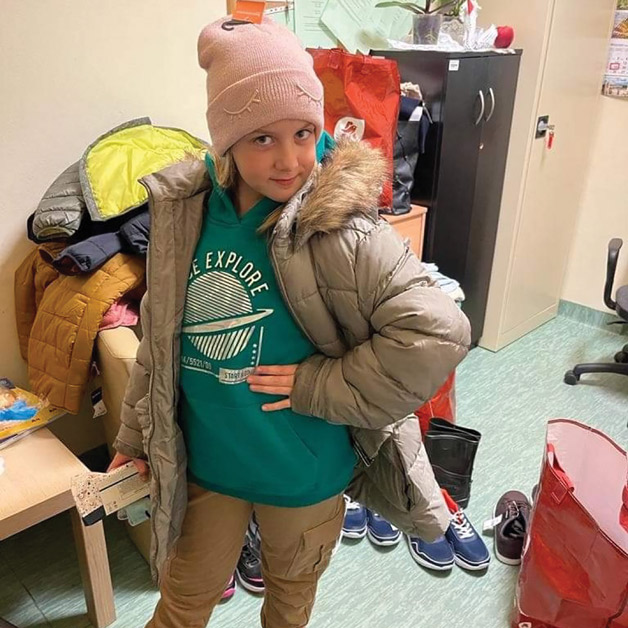
Ukraine refugee support became a passion for Mary Worstell ’73 along with her friends Kay Buzby, Tamara Bavendam and Teresa Bowers. They traveled to Krakow, Poland, in the fall of 2022, volunteering in refugee centers and purchasing clothes and basic needs for Ukrainian refugees who fled their country when war erupted.
Central College alumni possess the compassionate and empathic virtue to help individuals in crisis. Mary K. Glendening ’87 and Mary Worstell ’73 used their Central educations with international off-campus experiences and a strong science curriculum to leverage resources and support disasters.
From Calm to Chaos
Glendening shared her intense 72-hour experience with the Central RED Society in 2023.
June 3, 2018, began as a beautiful sunny day in Guatemala. By day’s end, Guatemala’s Fuego volcano had erupted spewing a five-mile stream of hot lava and dense smoke and ash down the mountainside burying small villages. The world changed for 1.7 million people in Guatemala from small villages to the capital of Guatemala City.
Fuego erupted right before noon. Many residents had gone to work. Children were in schools. For the small villages closest to the volcano, the devastation was horrific. The ash and gases burned people and killed 150.
The chaos and confusion erupted along with the volcano. Families were separated. “Where are my loved ones? Where can I get help?” echoed throughout the area.
Glendening, RN, MSN, FACHE, a hospital administrator at Shriners Children’s Texas, received a message for help. The hospital is a nonprofit pediatric burn center based in Galveston, Texas, and a research and teaching center with the University of Texas Medical Branch.
The rescue collaboration involved the U.S. military, Guatemalan officials, the U.S. State Department, the U.S. Embassy in Guatemala, Shriners Children’s Texas, Shriners in both Guatemala and Shriners International and three hospitals in Guatemala City.
“Our hospital was contacted because it provides care for children with burn injuries,” Glendening says. “I’m an administrator so I was called in for logistics and planning.”
Glendening elevated her psychology major and Spanish minor from Central to become a registered nurse and advanced healthcare professional who cares for children in crisis. She credits her passion and career for international service to her parents — Richard ’62, a professor emeritus of economics at Central, and Mary Roorda Glendening ’62 — who took their family three times to Mérida, Yucatán, Mexico.

Mary K. Glendening ’87, a hospital administrator and registered nurse at Shriners Children’s Texas, accepted the call to serve when Guatemala’s Fuego volcano erupted spewing a five-mile stream of hot lava and dense smoke and ash down the mountainside.
Coordinating Logistics
The Shriners Hospital’s headquarters is in Tampa, Florida. It helped with resources and making some of the calls needed to bring together all the pieces.
“We had collaborated with the army before to bring burn patients from Belgium,” Glendening recalls. “We called them because they had a big transport plane. They had to work through the military process of approvals and logistics.”
The Shriners’ team secured the U.S. Army burn team from San Antonio to help but not the airplane. Then the team contacted the Alabama Air National Guard to provide a large C17 plane with a team of pediatric specialists. It flew to San Antonio where it picked up the team of burn specialists. The Shriners Children’s Texas burn-unit specialists all needed to remain in Galveston to accept the incoming patients. This rescue required coordinating air space access and transportation with the airports in and out of Guatemala.
Glendening worked with the U.S. State Department and the U.S. Embassy in Guatemala because the Guatemalan patients didn’t have legal papers to travel to the U.S. They needed to travel through customs and across the border. The State Department gave emergency waivers.
“Guatemala security had tight control over access on one side of the airport with the large airplane carrying the huge amount of supplies for the hospitals. The Shriners in Guatemala called around and lined up 12 vehicles — that needed to get through security at the airport.”
When the State Department approved the U.S. military going to Guatemala with supplies and transportation for the burn patients, the mandate was that the plane could be on the ground for a maximum of four hours.
On the Ground
A crisis response team of two physicians and Glendening caught the first commercial flight into Guatemala City on June 4, 2018. The flight was delayed due to the amount of ash on the runway.
Upon landing in Guatemala City, a team of local Shriners took them to three hospitals in the area that were treating patients. The Shriners Children’s Texas physicians supported the local doctors on burn care.
“That first day, there was so much confusion. The halls were crowded with patients, families, media and healthcare workers all trying to figure out what was happening,” Glendening recalls. “So many people were searching for loved ones, wondering where their family members were. Imagine all the chaos that the local healthcare providers were dealing with — three hospitals and patients from the entire area coming for help.”
Glendening’s work focused on logistics and coordination for all the moving parts to make this a success. She looked at what resources were available locally, what resources the Shriners hospital could provide and who would go to Galveston for care. She then went from bed to bed identifying a list of patients who qualified to go to Shriners hospital.
Glendening recalls the military saying, “Mary, you need to make sure everything happens so that four hours later the plane takes off with patients. The plane leaves in four hours with or without patients!”
The local hospital logistics team informed Glendening the plane’s arrival time would be peak rush hour. At 7:15 p.m. all the supplies were loaded on the Shriners’ vehicles and convoying through Guatemala City at rush hour. Drivers were advised to remain very close to each other — 10 inches between vehicles.
“At one point a motorcycle slipped into the convoy. Men with machine guns in the operation stopped the convoy to get everyone back together. We arrived at the hospital at 7:53 p.m. I was watching the clock, quite nervous whether we could be back to the plane by 10:15 p.m.”
Glendening met with all the patients and explained what was happening. They were going to the United States, and they should bring their belongings. She remembers the father of one boy with severe burns, who indicated all he had was a backpack. There was nothing left; his wife and son had died in the volcano. All the ambulances lined up to get the patients to the airplane and the flight left with minutes to spare.
At 5:20 a.m. June 7, ambulances arrived at Shriners Children’s Texas carrying six children and their parents.
“Our team who had been down there were ready to go home to go to sleep. We had about fours of sleep the entire time in Guatemala,” Glendening remembers. “It is a work of compassion and love. At Shriners Children’s Texas, the healing begins. A lot of miracles happen there. Hope starts for the patients and their families.”

Mary Worstell ’73 volunteered for two weeks in Krakow, Poland, supporting Ukrainian refugee centers. She and three other women self-designated their group 4Women4Ukraine, or 4W4U for short. She connected with the group with a little heart hug from a Pella fair-trade store.
Women and Wartime
In April 2022, Worstell purchased a stretchy, cloth-covered, beaded bracelet in her favorite fair-trade store in Pella, Iowa, while attending a meeting at Central. The beads were blue and yellow, to match her constant concern for, and emotional connection with, the Ukrainian refugees displaced by the invasion of Ukraine.
After more than 40 years of working in public health around the world and in the U.S., she became deeply concerned about how political actions affect families, the challenges faced by women who, on their own, must feed and protect their children, physically and spiritually, using whatever desperate means available.
“I wore my heart on my wrist,” Worstell says, as she looks at the bracelet.
Through a gift of a similar bracelet to a colleague Tamara Bavendam, retired NIH physician, who shared Worstell’s angst, the two women joined an effort spirited by Teresa Bowers, a retired Polish physician, and Kay Busby, a cinematographer, to journey together to Krakow, Poland, to support Ukrainian women and families sheltered there.
The quartet of volunteers, who called themselves 4Women4Ukraine, raised $40,000 in gifts from family and friends to underwrite direct refugee support. Worstell and her colleagues each covered their travel expenses personally.
“For my part, I felt powerless to help these women facing terror and trauma of their crisis,” Worstell says. “Throughout my 40-plus years as a public health professional, I have witnessed extraordinary challenges women face to protect their children, and their community, often at great personal risk. This is greatly magnified in a war zone.”
“The Ukrainian women literally escaped Ukraine with nothing except the responsibility of protecting their children,” Worstell explains. “They were forced to abandon their home and they led their children into the unknown, afraid for what they must face and with the deep fear of casualties of family members who remained fighting in Ukraine. With staggering responsibility, the Ukrainian women were utterly dependent on a stranger’s kindness. How can anyone, and especially any woman, not internalize this sense of desolation? Together, our quartet of women knew we had to help in some way. We acted.”
Worstell is a retired advisor to the Office of the Assistant Secretary for Health, U.S. Department of Health & Human Services in Washington, D.C. She also serves as a member of the Central Board of Trustees. At Central, Worstell focused her studies on biology and Spanish, studying in the college’s Yucatán program (two semesters) and a year in Central’s Spain study abroad program.
“My parents instilled in me a passion and curiosity about the world condition. Central gave me wings to experience our planet and find my path to improve the human condition where people live,” Worstell says.
What Volunteers Can Do When You Get Creative
Immediately upon arrival in Krakow, the quartet began working with the leadership of the two municipal refugee centers. The women worked almost exclusively in support of the center staff providing refugee care. The refugees feared association with Americans because if the Russians learned of this it might punish their family members in Ukraine.
“The Center leaders were extraordinarily capable and emotionally invested in the refugee well-being. There’s always a need for volunteers willing to do the grunt work so that the staff can do their mission,” Worstell says. “My colleagues and I acted as their ‘extra hands’ operating under their direction, asking ‘What do you need and how can we get this for you?’ The leaders cried, they were so grateful for our support months after the world’s attention had shifted away from Ukraine and the refugee plight. And, of course, we respected the refugees’ fears and were, essentially, anonymous to them.”
Worstell explains that their goal was to provide functional assistance that would enhance the quality of life for the refugees themselves and the center staff whose caregiving was reaching burnout. Physically and emotionally, 4W4U wanted to lighten the spirits of both.
Their work for the centers focused primarily on shopping for endless amounts of winter clothes and other supplies for children of all ages, as well as adults and seniors. After each shopping expedition, the center leaders distributed underwear, pajamas, clothing, coats, shoes and boots to refugees.
“When there was a gap or a need, we’d receive a new shopping list for unmet clothing categories. We continued until most immediate refugee needs were met, using the funds raised in the U.S.” Worstell says.
The women also purchased IKEA gift cards for refugees who were transitioning from the centers to city apartments. These helped purchase household living essentials. Finally, the quartet provided sports equipment and movie and other entertainment passes for refugees and center staff to experience life’s joy.
By walking the city, the group identified a second volunteer opportunity at the Krakow Jewish community center and dedicated hours there almost daily. The task was to measure bulk packages of cereal, grains, coffee and tea into individual servings that were distributed daily to refugees living outside the municipal centers.
Through networking, 4W4U learned of two final assistance opportunities in Krakow. They supported the local Rotary Club with their refugee assistance efforts, including retrofitting armored trucks into ambulances for delivery to the Ukrainian frontlines. They also helped a neighborhood soup kitchen, run by volunteers who supplied meals to refugees daily.

Worstell and her friends were so thrilled when they received photos of refugees wearing the clothes that had been purchased for them. To see the beautiful smiles on the children’s faces was priceless, Worstell remembers.
Meaningful Work
The quartet’s memories are deeply ingrained.
“There were so many moments,” Worstell says. “Seeing a picture of a refugee’s joy in receiving unexpected new clothes was all I and any of my companions needed. To see beautiful smiles on the children’s faces was priceless. We feel blessed we were able to help in some small way.”
The 4W4U journaled their two-week trip on a blog: 4women4urs.wordpress.com.
Photos by: Paul Joy, Mary Glendening, Tamara Bavendam












To encourage serious, intellectual discourse on Civitas, please include your first and last name when commenting. Anonymous comments will be removed.
Comments are closed.